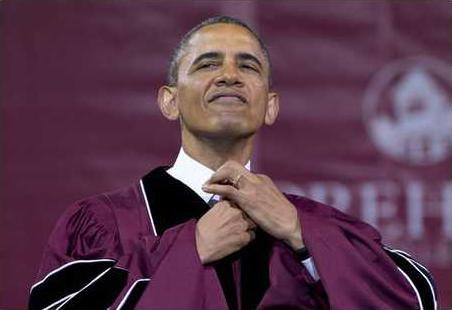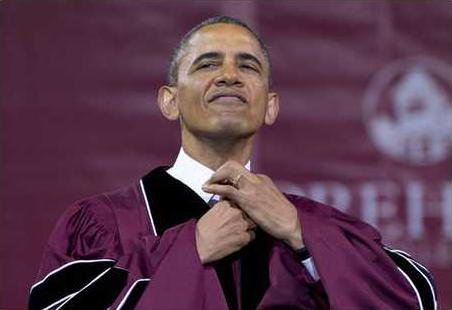It’s graduation season, which means it’s time to slap on ridiculous hats and prepare to listen to an older, wiser person tell students what to do with the next step of their lives.
As Ira Glass, producer of the radio show This American Life, said in his commencement speech to Goucher grads in 2012, “Commencement speakers give stock advice, which is then promptly ignored. The central mission of the commencement speech is in itself ridiculous to inspire at a moment that needs no inspiration.”
But some, facing the risk of a “doomed form,” press forward and manage to inspire us. Here are 10 of the most classic graduation speech topics and the speakers who delivered the message better than most.
The reality check speech
Who: Barak Obama, president of the United States
Where: Morehouse College, Atlanta, Georgia
When: May 2013
Why: Sometimes inspiration is best delivered with a metaphorical slap to the face. Millennials are most criticized for a possessing a strong sense of entitlement, but as President Obama points out, this is not the time for that.
Quote: “It’s just that in today’s hyper-connected, hypercompetitive world, with millions of young people from China and India and Brazil — many of whom started with a whole lot less than all of you did — all of them entering the global workforce alongside you, nobody is going to give you anything that you have not earned.”
The tough love speech:
Who: David McCullough Jr., teacher
Where: Wellesley High School, Wellesley, Massachusetts
When: June 2012
Why: Over the past two years this speech has risen in fame. Originally McCullough was criticized by his students’ parents for telling their children that they aren’t special, but now he’s held up as some sort of hero.
Quote: “Contrary to what your … soccer trophy suggests, your glowing … report card, despite every assurance of a certain corpulent purple dinosaur, that nice Mr. Rogers and your batty Aunt Sylvia, no matter how often your maternal caped crusader has swooped in to save you … you're nothing special.”
The speech with staying power
Who: David Foster Wallace, author
Where: Kenyon College, Gambier, Ohio
When: May 2005
Why: Easily one of the most quotable commencement speeches ever given, Wallace’s speech was later turned into a book and an inspirational video. Its topic? The banality of life. His use of strong metaphor and down-to-earth refusal to waste time trying to inspire make this speech a blunt guide to applying meaning to otherwise meaningless daily tasks.
Quote: "'Learning how to think' really means learning how to exercise some control over how and what you think. It means being conscious and aware enough to choose what you pay attention to and to choose how you construct meaning from experience. Because if you cannot exercise this kind of choice in adult life, you will be totally hosed."
The speech with the best advice
Who: Jane Lynch, actress and comedian
Where: Smith College, Northampton, Massachusetts
When: May 2012
Why: Lynch gave bold alternative to life after school, she told the women of Smith College to look at their lives differently than they have for the past 20-plus years.
Quote: “Don’t have a plan. Plans are for wusses. Don’t deprive yourself of the exciting journey your life can be when you relinquish the need to have goals and a blueprint. … When you feel sick to your stomach, it’s a good thing! It signals ‘Opportunity for big growth ahead!’ ‘Something’s coming, something good.' Don’t ignore the nausea. Step up to it.”
The permit failure speech
Who: Ed Helms, actor and comedian
Where: Knox College, Galesburg, Illinois.
When: May 2013
Why: Telling grads to not fear failure is a typical commencement topic, but Helms blunt approach makes the messages a little louder and a little clearer.
Quote: “So long as your desire to explore is greater than your desire to not screw up, you're on the right track. A life oriented toward discovery is infinitely more rewarding than a life oriented toward not blowing it.”
The key to no regrets speech
Who: George Saunders, professor and author
Where: Syracuse University, Syracuse, New York
When: May 2013
Why: In the pursuit of success and prestige, sometimes it’s nice to be reminded to take note of those around us. Like Saunders said, “All that I regret can be whittled down to one thing …”
Quote: “Do all the other things, the ambitious things — travel, get rich, get famous, innovate, lead, fall in love, make and lose fortunes. ... But as you do, to the extent that you can, err in the direction of kindness.”
The don’t get cocky speech
Who: Cory A Booker, politician
Where: Brandeis College, Waltham, Massachusetts.
When: May 2009
Why: Booker balanced the topics of appreciating the gifts of those who’ve gone before with a call to be the change you wish to see.
Quote: “You drink deeply from wells of freedom that you did not dig. The primary choice, I believe, of your life is to accept the conditions as they exist or to accept the responsibility for changing them.”
The speech most likely to make college grads question their last four years
Who: Steve Jobs
Where: Stanford University, Stanford, California
When: May 2005
Why: There’s nothing quite like a genius millionaire who never graduated with a degree to inspire recent graduates to think that maybe being recent graduates isn’t special. But, the crux of his message is to follow your passion and pay no heed to the rules.
Quote: “I decided to drop out and trust that it would all work out OK. It was pretty scary at the time, but looking back it was one of the best decisions I ever made.”
The self-reflection speech
Who: Cornel West, professor and activist
Where: Spelman College, Atlanta, Georgia
When: May 2009
Why: West is known for his crusade for human rights; he takes the opportunity to speak to Spelman graduates about what they can do to improve the future for themselves and for everyone else.
Quote: “It takes more courage to examine the dark corners of your own soul than it does for a solider to fight on the battle field. You have to be courageous to be a free-thinker and go against the grain.
The speech that calls for change
Who: John F. Kennedy, former President of the United States
Where: American University, Washington D.C.
When: June 1963
Why: Some of the most inspirational speeches plead for a change of thought. Kennedy in the midst of the Cold War asked the students of American University to remove the blame from the Soviets and consider their own contribution to war and peace.
Quote: “Let us examine our attitude toward peace itself. Too many of us think it is impossible. Too many think it unreal. But that is a dangerous, defeatist belief. It leads to the conclusion that war is inevitable — that mankind is doomed — that we are gripped by forces we cannot control. We need not accept that view. Our problems are manmade — therefore, they can be solved by man.”
ARTICLE ENDNOTE: EMAIL: nshepard@deseretnews.com TWITTER: @NicoleEShepard
Top 10 college commencement speeches





